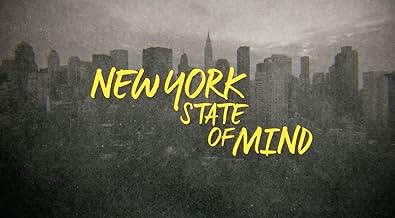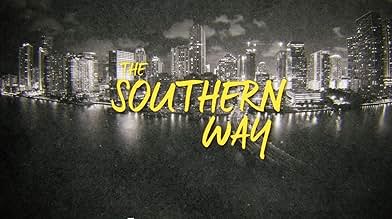NOTE IMDb
8,4/10
6,6 k
MA NOTE
Le DJ et journaliste Shad Kabango rencontre les plus grandes stars du hip-hop pour retracer le parcours du hip-hop et comment ce style est devenu la musique la plus célèbre du monde.Le DJ et journaliste Shad Kabango rencontre les plus grandes stars du hip-hop pour retracer le parcours du hip-hop et comment ce style est devenu la musique la plus célèbre du monde.Le DJ et journaliste Shad Kabango rencontre les plus grandes stars du hip-hop pour retracer le parcours du hip-hop et comment ce style est devenu la musique la plus célèbre du monde.
- Récompenses
- 5 victoires et 3 nominations au total
Parcourir les épisodes
Avis à la une
There is a lot here and covers the basic of a lot of hip-hop, but misses the opportunity to talk about so many influential artists in the geographic locations they cover. Docu-series is very well made a produced, really great interviews.
Based on the first season, I love this series... It's just so entertaining!
I'm sure some stuff is being fast forwarded and glossed over, but for what it is... I am thoroughly entertained and informed...
My only gripe is that when Shad roll up and meets one of the OGs, I wish there was some teeny, tiny way to infer a small passage of time, because he rolls up, shakes hands, says hi, then immediately goes, "Let's start with when you got together with so and so.."
It's minor, I know, and I know it's (probably) not the reality of the meetings/interviews, but it's playing like he says hi and hits them with the question - so cold.
Does that make sense?? Like, am I the only one who's taking it like that??
My only gripe is that when Shad roll up and meets one of the OGs, I wish there was some teeny, tiny way to infer a small passage of time, because he rolls up, shakes hands, says hi, then immediately goes, "Let's start with when you got together with so and so.."
It's minor, I know, and I know it's (probably) not the reality of the meetings/interviews, but it's playing like he says hi and hits them with the question - so cold.
Does that make sense?? Like, am I the only one who's taking it like that??
Hip-hop was my life growing up, as it was the life of so many around me. My earliest memories were Run DMC, Kurtis Blow and the Beastie Boys. In fact, I remember trying to "scratch" on my mom's record player because of hip-hop. So to see this four part tribute to its origins was just magnificent.
The team that put this together went back to the genesis: Bronx, New York. They started with the underground parties of Kool Herc and progressed through the timeline from there stopping at the contributions of Afrika Bambata, The Furious Five, The Sugarhill Gang, Run DMC and others.
What cannot be overlooked is the contribution of Grandmaster Flash. What he did for hip-hop was nothing short of wizardry. He was a scientist when it came to mixing and spinning two turntables. I was floored to hear about how he started and what he started with. It was amazing to hear about a music style that blossomed in the 80's but can really be traced to a time period well before that.
I think anyone that has a serious interest in hip-hop should watch this documentary. It was somewhat nostalgic for me because many of the artists mentioned and interviewed were artists I enjoyed as a kid. I was slightly disappointed that some--what I consider pioneers--were not mentioned. Those like KRS One, Fat Boys, Doug E Fresh, Whodini, Salt-N-Pepa, Slick Rick and more. I also would have liked to see hip-hop's first entry into movies as I remember Krush Groove, Breakin' and Beat Street.
Even with those absences I was impressed. There's only so much you can cover anyway and I know they tried to hit the highlights. It is still a seminal work that has paved the way for even broader endeavors. This was an essential lesson in hip-hop 101 that has no substitute at this time.
The team that put this together went back to the genesis: Bronx, New York. They started with the underground parties of Kool Herc and progressed through the timeline from there stopping at the contributions of Afrika Bambata, The Furious Five, The Sugarhill Gang, Run DMC and others.
What cannot be overlooked is the contribution of Grandmaster Flash. What he did for hip-hop was nothing short of wizardry. He was a scientist when it came to mixing and spinning two turntables. I was floored to hear about how he started and what he started with. It was amazing to hear about a music style that blossomed in the 80's but can really be traced to a time period well before that.
I think anyone that has a serious interest in hip-hop should watch this documentary. It was somewhat nostalgic for me because many of the artists mentioned and interviewed were artists I enjoyed as a kid. I was slightly disappointed that some--what I consider pioneers--were not mentioned. Those like KRS One, Fat Boys, Doug E Fresh, Whodini, Salt-N-Pepa, Slick Rick and more. I also would have liked to see hip-hop's first entry into movies as I remember Krush Groove, Breakin' and Beat Street.
Even with those absences I was impressed. There's only so much you can cover anyway and I know they tried to hit the highlights. It is still a seminal work that has paved the way for even broader endeavors. This was an essential lesson in hip-hop 101 that has no substitute at this time.
I really enjoyed this series documenting different periods in the formation of hip-hop. Although I feel like it didn't necessarily do enough to describe the anger and philosophy that was a huge part of hip-hop (except during its parts about the Message and gangsta rap), it provided a fairly well-rounded historical analysis of the musical interplay that allowed the form to progress, to grow richer and more varied, and to move beyond the party music of the late 70s to a more socially conscious art-form.
The most important and enriching aspect of this show is the commentary provided by hip-hop legends and people who were there, as well as how it shines light on some unsung heroes of early rap music. It was extremely watchable and interesting, and I can't wait until Season 2 when it delves into the 90s and hip-hop explodes and becomes the cultural juggernaut that it is today.
The most important and enriching aspect of this show is the commentary provided by hip-hop legends and people who were there, as well as how it shines light on some unsung heroes of early rap music. It was extremely watchable and interesting, and I can't wait until Season 2 when it delves into the 90s and hip-hop explodes and becomes the cultural juggernaut that it is today.
Fourth season now and no love for guys like Twista, Tech, Do Or Die, Or Bone thugs-n-harmony? Disappointing there.
Le saviez-vous
- AnecdotesProducer Sam Dunn had previously completed a documentary called Metal: A Headbanger's Journey which explored the evolution of heavy metal music and attempted to categorize and classify the various bands and subgenres of heavy metal. This documentary was produced in a similar style and approach although with less structured classification and an obvious focus on hip-hop music.
Meilleurs choix
Connectez-vous pour évaluer et suivre la liste de favoris afin de recevoir des recommandations personnalisées
- How many seasons does Hip-Hop Evolution have?Alimenté par Alexa
Détails
- Date de sortie
- Pays d’origine
- Sites officiels
- Langue
- Aussi connu sous le nom de
- Sự Phát Triển Của Hip-Hop
- Lieux de tournage
- Société de production
- Voir plus de crédits d'entreprise sur IMDbPro
Contribuer à cette page
Suggérer une modification ou ajouter du contenu manquant
































